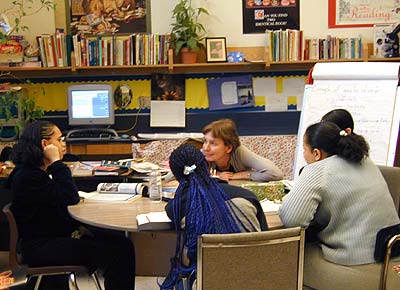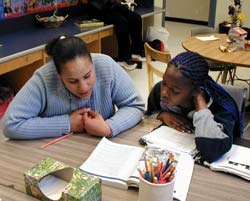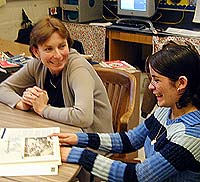 |
Elizabeth Anderson (facing camera) with Mahogany, Dolores, Liana, and Socorro, four of the Berkeley High students who attend Meritt College. (Carol Hyman) |
Grad student creates refuge for learning in Berkeley High classroom
BERKELEY – When Elizabeth Anderson arrived at Berkeley High School in fall 2001, the University of California, Berkeley, PhD candidate simply planned to develop a reading program for the special education program.
But instead, Anderson single-handedly created a classroom that today is "a safe haven for some of our most fragile girls," according to a Berkeley High administrator. It's common for Anderson to be at the school all day, and sometimes into the evening.
In Room G104h, up to 10 girls at a time spend their lunch break, a scheduled class period or time after school with Anderson reading, sewing, writing, exploring friendships and, at times, dealing with life crises.
"Elizabeth wanted to work with eight girls when she started," said Lilly Wong Fillmore, UC Berkeley professor of education and Anderson's adviser, " but within the first 10 days of school, practically every single girl in special ed wanted to be in the program."
The girls, who have almost all been diagnosed with language-based learning disabilities, had ironically ended up in classes which Anderson believes limited rather than facilitated their language use and development. "Because girls are such a small minority in special education, they had few opportunities for positive peer interactions — despite research that shows that strong relationships are fundamental to female learning," Anderson said. "Most of them had learned to be quiet so as to avoid confrontations.
"Research shows that girls who end up in special ed are in very serious trouble in many areas of their lives. Also, because girls with disabilities or school difficulties have rarely been a specific focus in school settings, they tend to be much more in need of help and see themselves as much more damaged."
But with Anderson's guidance and intervention, and through their own hard work, some of the girls have achieved successes they'd never dreamed of.
Liana, 18, a senior, never thought she'd graduate from high school. But she and four of her high school classmates are attending Merritt College this semester. Anderson discovered her students could enroll at Merritt while still in high school, and she goes with them, sitting in the back, making a master copy of her notes and helping them study.
During a recent study session, the girls were animated, chiming in with answers to questions Anderson posed. The girls seemed to understand easily the information presented in their complicated child development text, learning the technical terms and elaborating on the material they were absorbing. Mahogany, one student who seemed to be especially worried about her grasp of the material, was particularly vocal, correctly answering question after question.
Another success is Socorro, age 14 and a junior, who began school unable to speak English. She now writes poetry in English and her native Spanish
"I don't care what people say about me being in special ed," said Sierra. "You get to meet new people, and you get to talk about anything. People here don't judge, and Ms. Anderson is cool."
 Liana and Dolores work together on a child development assignment. |
"Elizabeth has created an atmosphere in which our girls can connect with each other on an intellectual and emotional level," said Clare Davies, head of Berkeley High's special education program. "The classroom is always open throughout the day."
Anderson, 48, always knew she wanted to return to the classroom. After all, she had been a special education teacher in Contra Costa County for more than 20 years.
"I decided to get a PhD because I felt it was necessary to validate my research and practice in a world where theory and practice are often far removed. I had an area which I really wanted to address in a larger sphere than my classroom and needed the degree to do this, " Anderson said. "The dissertation, in simple terms, is an ethnographic study of girls in special education - an examination of the process under which they are referred and labeled, and the consequences of that process."
When she started at Berkeley High, Anderson had no idea she would become involved with and devoted to a group of what she calls the most resilient, determined, vulnerable and talented students she has ever met. "I am constantly amazed at their strength - the way they keep coming back to a school system which rejects them so soundly," Anderson said.
"These are kids who are described as having major problems with language, but their classroom experiences had focused on closely circumscribed goals and objectives, and 'remedial reading materials' and phonics drills. I hypothesized that this material was actually holding them back. I picked a whole variety of materials to read based on ways in which I thought the girls could be motivated, and it was certainly not remedial material."
For example, the girls recently finished Sandra Cisneros's "House on Mango Street," read a column in the San Francisco Chronicle on bullying and discussed Walt Whitman's poetry.
A few of the girls admit that Anderson's long narrow classroom feels even more welcoming at times than their own homes. It's a place where they can vent, say almost anything and have the support of girls who, despite different ethnic backgrounds and socio-economic status, are there for each other to
listen, give feedback, joke with and hug.
Anderson has made her classroom as friendly as possible, despite the school's lack of financial resources. She scrounged some tables from down the hall, and fills the room with bought, bartered and donated books, posters, artwork and one lone Macintosh computer.
"Everything in the classroom - almost down to the last felt tip pen, was chosen to promote interaction and language use," Anderson explained. "That's why there are round tables, baskets of pens and pencils to be passed and shared, a birthday calendar, photos of the girls, magnetic poetry. I usually keep fresh flowers on the table because the girls like to share them and take them home.
"This is also the reason for the other activities, such as sewing or field trips - they promote interaction, creativity, a sense of accomplishment and a sense of being valued. Some people might see all these as 'extras,' but I see it as basic to promoting the sort of learning that I want to go on."
Anderson has actively sought donations. She has cold-called businesses, bookstores and publishers, and she has applied to private agencies and called upon friends, coworkers and UC Berkeley faculty members for help. For example, an interior designer in San Francisco donated beautiful fabric so the girls could make shawls to give their mothers for presents. A neighborhood bakery invited the girls in to make gingerbread houses for Christmas - a rare treat none of them had experienced before.
At a recent lunchtime, the room was buzzing with conversation. Socorro was anxious to share some of her new poems. She started writing poetry after the death of a beloved cousin; many of her poems are about loss. But not all of her poems are filled with despair. "Dreams," she writes in one of her poems, "come true if you try, if you trust in yourself." Socorro's dream is to become a published poet. She also thinks about becoming an architect, a mechanic or a film director.
 Socorro smiles as she tells Anderson a story about her little brother. |
Anderson's goal for Socorro and her classmates is to develop ways for them to learn, but since there is almost no research about working with girls in special education for her to draw upon, she is constantly learning and inventing with the girls as they go along.
"Elizabeth came upon a need that was terrific, but there were no resources or models for her. Now they get mentors, kindly enthusiasm and supported instruction to push them further and further," said Fillmore. "Like any high school kids, they have good days and bad days. But the girls have become a peer support group for each other. They console each other, they come to each other."
Although Anderson works as a case manager for some of the students in the special education department, she has donated her time to the girls' program.
Anderson has high hopes for these girls, but she is realistic about what their future might hold. "I am hoping they have become kids who value what other people may denigrate in them - such as their bilingualism, creativity and assertiveness," Anderson said. "I want each one of them to be capable of independence and aware of choices and the many ways there are to choose, to have learned what it is to form close relationships, and to have mastered some craft - ideally writing - which can provide a lifetime of pleasure and creativity."
Her hope is that the girls will continue their friendships and support for each other, because she believes that's from where their real strength is derived.
"My dissertation will get written, I'll get that diploma, but it's the girls-they are who will make it happen by bringing theory to life," Anderson said. "If it weren't for their enthusiasm, their willingness to work hard and cooperate and take risks and really learn, there would be no program."

